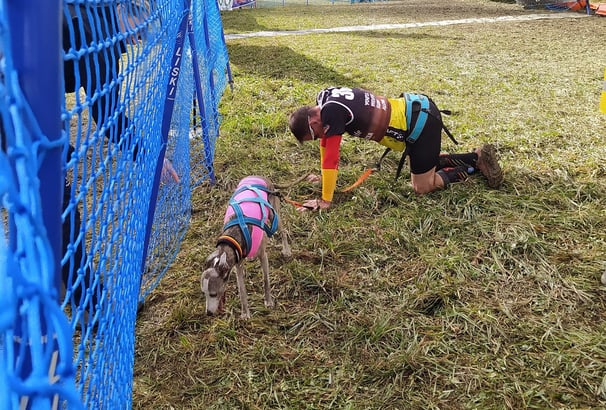ICF Canicross World Championship
Stay up to date with what happened at the 2024 Canicross World Championship in Bardonecchia, Italy.
Rodrigo Damião
1/27/202510 min read
In October 2024, the canicross community witnessed one of the most anticipated events of the year:
The ICF Canicross World Championship
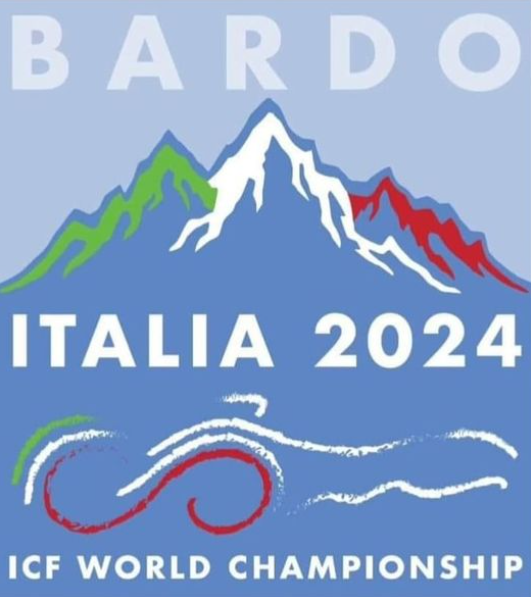

The charming town of Bardonecchia, nestled in the Italian Alps, became the stage for the ICF Canicross World Championship. After a 12-hour flight from Brazil, the Canicross Magazine team and I arrived to find a setting that seemed tailor-made for the sport. The cold weather was perfect for high-intensity races, but it was the course that dominated conversations everywhere we went. It presented a challenge that left athletes both nervous and excited.
The route, characterized by steep climbs, sharp descents, and relentless mud from the week's rain, tested the limits of both humans and dogs. Safety was a constant concern among competitors, who feared for both their physical well-being and that of their animals. Videos of athletes recognizing the course went viral on social media, showing sections that seemed almost impossible to cross due to the slippery mud, over 5 cm deep. Walking was a challenge, and running with a dog pulling seemed almost impossible.
Despite the absence of some top competitors who chose to race in the IFSS European Championship in Finland, Bardonecchia gathered an impressive elite, including names like 2023 champion Ben Robinson, the French duo Jerome Henrion and Claire Maloisel, Brazilian Matheus Oliveira, and German Carolin Joeken, among other top athletes from canicross, bikejoring, and scooter. The notable presence of these athletes ensured that the championship maintained its prestige and competitive level.
The traditional opening ceremony took place with national delegations parading through the charming streets of Bardonecchia. I participated in this historic moment alongside the vibrant Brazilian duo Eduardo and Andreia Ribeiro, and I could feel the contagious energy of the event. The hospitality of the Italians, who cheered from windows and balconies, made the experience truly unforgettable.
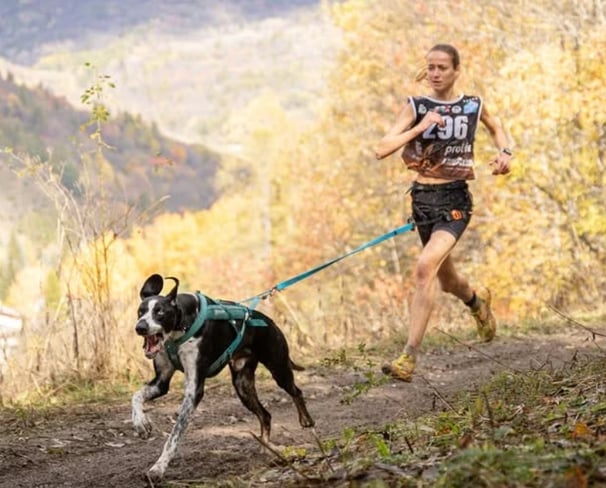

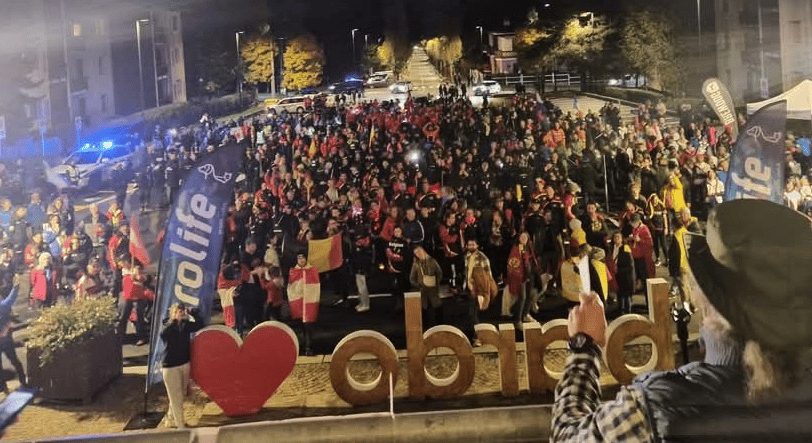

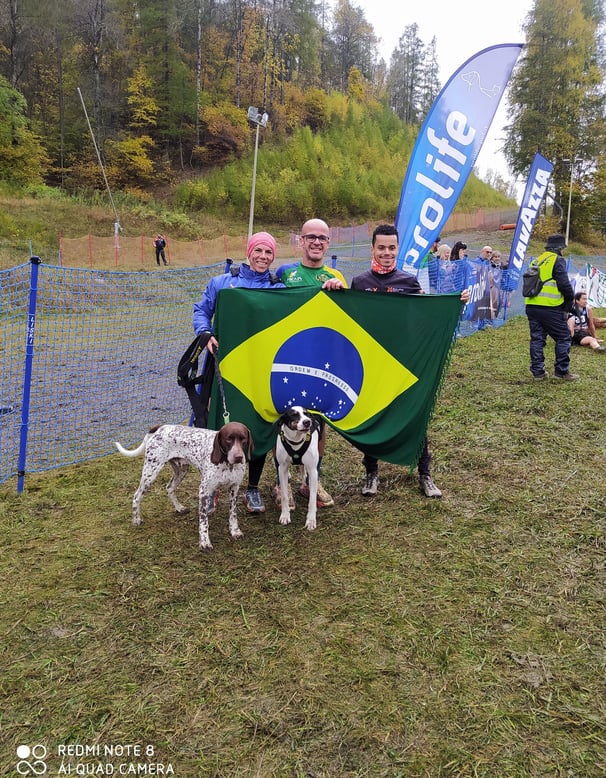

Day 1: A Test of Endurance and Strategy
On the first day of competition, the morning started with clear skies and slightly firmer ground, as there had been no rain overnight. The atmosphere was high as the athletes prepared to face the challenging course. The route began with a steep climb that tested the determination of any competitor right from the start. With each arrival at the finish line, athletes, covered in mud and completely exhausted, would collapse to the ground, drained after overcoming the sharp turns, climbs, and descents of the course. It was a beautiful scene of battle. It felt like watching true gladiators after a victorious fight in the coliseum arenas.
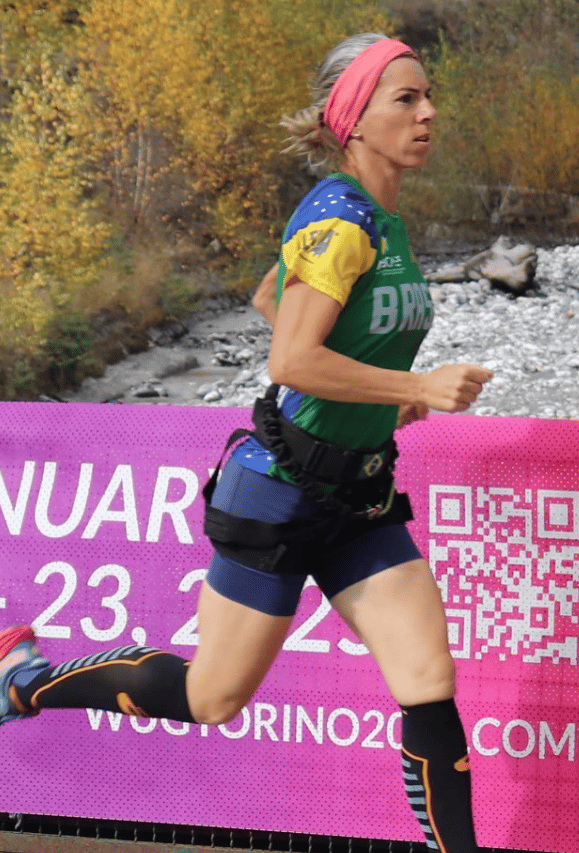

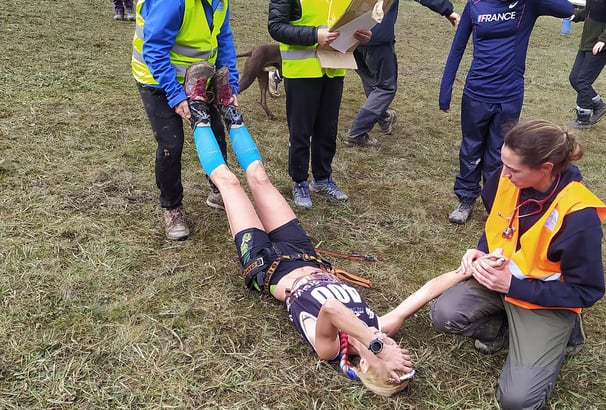

Day 2: The Final Challenge
The second day began with a light drizzle. The athletes took their positions to face another day of intense efforts. The excitement reached its peak as the competitors crossed the finish line. Tears of relief and triumph were common, as each person experienced the climax of their journey.
Among the most emotional stories was that of Andreia Ribeiro, representing Brazil in her first world championship. With tears in her eyes as she completed the race, Andreia reflected on the significance of competing in such a grueling event, and the value of all the years of dedication alongside her husband and fellow competitor Eduardo Ribeiro. For them, completing the race was more than a personal achievement; it was a message that athletes from countries without a tradition in the sport can reach their greatest dreams and goals if they desire it enough. The determination of this Brazilian couple to elevate canicross in Brazil and inspire others to pursue their dreams was truly remarkable. At the end of this article, we have an exclusive interview with them for you to check out.
The award ceremony was beautiful, and we witnessed impressive results in all categories, which you can follow on the ICF’s Facebook page (International Canicross Federation).
In canicross, we would like to highlight Ben Robinson, who defended his title by posting the best time over the two days of competition, Carolin Joeken, who took first place in the women's canicross, and Luki Junge in the Junior category.
Stay tuned for the exclusive interview with Andreia and Eduardo Ribeiro, followed by an interview with the female champion, Carolin Joeken.
Canicross Magazine:
What motivated you to participate in the Canicross World Championship in Italy, and how was the experience of competing in such a large event?
What motivated us was the pursuit of knowledge, learning, and bringing the evolution of the sport to Brazil. Having the opportunity to showcase Brazilian canicross to the world, showing that here in our country we have excellent athletes, and drawing the attention of more experienced countries to help us with the growth of the sport.
Competing in such a big event was an unforgettable experience. Seeing up close athletes we follow and look up to, witnessing high-performance canicross in other countries, and experiencing the diversity of cultures was something we will remember forever.
What were the main challenges you faced during the competition, and how did you manage to overcome them?
The biggest challenge was financial, without a doubt. A trip to Europe for two people and two large dogs is not cheap, plus all the costs for documentation and exams to meet the requirements for the dogs' travel.
Also, the travel time was quite exhausting. It was a 12-hour flight, followed by a 13-hour car ride until we arrived in Bardonecchia. The fatigue from the journey was another significant challenge.
We managed to ease the financial challenge by launching an online fundraiser, where we raised 10% of the total travel cost. We also had support from Ultra Pet Alimentos (our dog food supplier), which helped us. The remaining 80% was paid out of our own pockets—or rather, it continues to be paid out of our pockets.
As for the exhaustion from the long hours of travel, we were well-trained and already aware of what the journey to Bardonecchia would be like. With the support of our coach Marco Ferreira, recovery was easier.
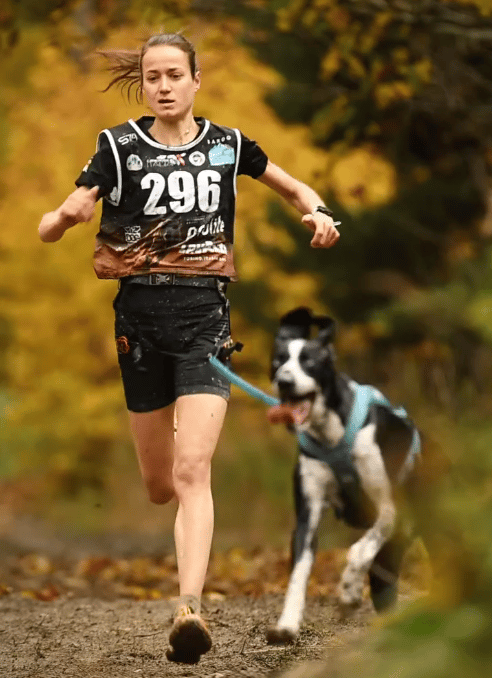

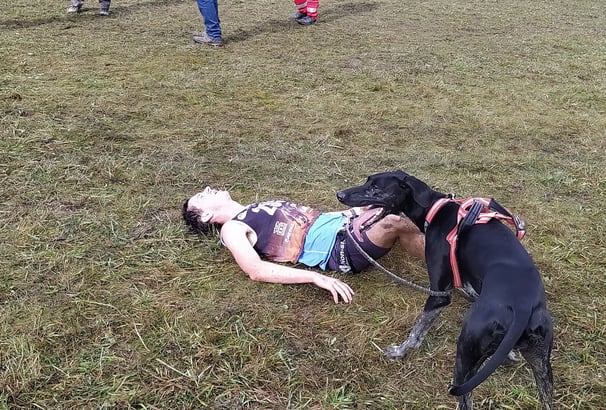


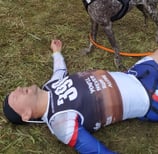
Photo: Hermans Anaïs
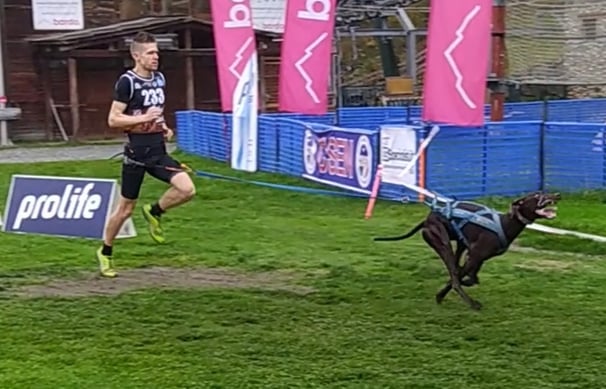

Photo: Rafa Medeiros
How did you feel when you completed the race? What did it mean to you and to the growth of Canicross in Brazil?
This was our first international competition, and just being able to go was already a big achievement for us and for the growth of the sport in Brazil. But completing both days of the race, with all the challenges we faced, was something spectacular.
As soon as we crossed the finish line on the first day, we felt that we could leave our mark on the ICF World Championship. We secured a good placement. Crossing the finish line on the second and final day was incredibly emotional. All the hard work throughout the year, all the sacrifices we made to be there, the sense of accomplishment for Brazilian sports—an overwhelming flood of emotions, it was impossible to hold back the tears.
We are grateful for our dogs, who played an excellent role despite the exhaustion from the journey. We are sure this is the sport we want to develop and immerse ourselves in for many years to come.
Competing on both days of the championship and performing as we did, even in our first year, caught the attention of more experienced countries, positioning Brazil as a competitive country, capable of competing with the giants of global sports. This will undoubtedly bring more sports development and draw attention to the growth of the sport in our country.
What lessons or learnings did you bring back to Brazil from this experience at the world championship?
The biggest lesson, we believe, is that in European countries, especially, they really live the sport 24/7. They dedicate themselves fully, and it’s not just the dog-and-human duo—it's the whole family. Parents, children, puppies—all participate in the sport, all dedicate themselves to it.
The organizations are focused on providing Canicross, Bikejoring, and Scooterjoring events frequently, offering athletes several races each month. Athletes, in turn, dedicate themselves to attending all the events in their region and nearby regions.
These are the learnings we brought back to Brazil—to give all athletes the opportunity to discover Canicross.
How do you see the future of Canicross in Brazil, and what are the next steps you plan to take to further develop the sport here?
We see the sport growing in all regions of Brazil. With the help of ABCAES (Brazilian Association of Canicross and Similar Sports), the demand from trail event organizers wanting to include canicross in their races has been increasing. As a result, new enthusiasts are emerging, which will bring new athletes to the sport. We continue working to ensure that canicross and similar sports are known and practiced correctly throughout the country. To achieve this, we have become collaborators of ABCAES and, together with the association, embrace the challenge of making the sport more recognized and widely practiced in our country.
What advice would you give to Brazilian athletes who dream of competing in international Canicross events?
If your dream is to compete in a World Championship, study a lot about development techniques for your dog’s running. Ask for help from more experienced athletes. In Canicross, the dog's performance is crucial for the duo’s success.
Start your training with a professional who can assist you and help improve your performance. Your training needs to be properly monitored, so have a good coach.
Don’t give up at the first difficulty. Set your goal and keep moving toward it. There will be people who will support you and others who will try to discourage you. Know exactly what you want and keep going. We are living proof that dreams can come true.
Interview with Carolin Joeken
Canicross Magazine:
Caro, you were the fastest woman in the world in 2024, winning the Gold Medal at the World Canicross Championship. How did you prepare to achieve such a coveted position?
Since i was a little girl in have been passionate about running.
Its my passion just as dogs are an important part of my life too.
Canicross is the perfect sport to combine both.
I prefer running long distances (half Marathon and marathon) so i train s lot of kilomters (more then 100km per week)
I optimized my Training for the world championchips a bit by Training a lot of hills. But since the foundation was solid and i was already in a good shape. I just needed to optimize this form a little further.
The same for my dogs Nick and ari. They just did more strenght and Hill intervals.
After your incredible time on the first day of competition, you started ahead of legends like Antony Le Moigne and other fast men on the second day. What was it like to be among them, representing the female category?
when i was allowed to start on the second Day as first woman with all the fast mens i was speechless. It all seemed unreal!
At the same time i was incredibly proud of my young dog and myself.
Do you believe that your performance can open doors for more women to stand out and get interested in the sport?
I hope that through my success i have been able to inspire more woman to take up this great Sport. I habe been able to motivate them and be a role Model. Here in germany many more woman practice the Sport and woman face significantly stronger competition than the mens
What were the biggest challenges you faced during the competition, both technically and emotionally?
the biggest challenge for me was choosing the right dog. I actually wanted to run with Nick( 6years) my older, more experienced dog but i could not Brake him on the steep downhill sections.
My young dog Ari (2years) dont had any experience.
We were also not yet a well coordinated team.
But i trusted him, believe in him and wanted to give him the Chance to prove himself. Ari did not disappoint me and so after the first Day of racing with one Minute lead over the second Lady i was simply overwhelmed and proud of this young dog.
The trail was hard for us but we liked it!
I prefer technically challenging trails.
The uphill section was not a big challenge; on this trail you had to be good at running downhill to be able to keep up with the front runners.
What does this title mean to you personally and for your career in canicross? Is there anything special you'd like to say to those who support you or are inspired by you?
the title itself doesnt mean that much to me. Its the reward for all the hard trainings.
What means much more to me is that i was able to form a team with my young boy ari. We grew together and trusted each other which made us unbeatable. This feeling is ❤
When i started the sport (2016) i never dreamed that i would become world champion.
Fastest german canicross team (male and female) was incredible for me.
Then came the third place at Ech belgium and leipa. It was clear that this would be difficult to top. But we did!
I will continue do the sport with passion and if everything goes well i will of course try to defend our title.
A big thank goes to my sponsores and to my family, especially my husband who came with me to italy to support me and believe in me.
Dont be afraid to contact me if you have any questions! Iam happy to help and share my experiences.
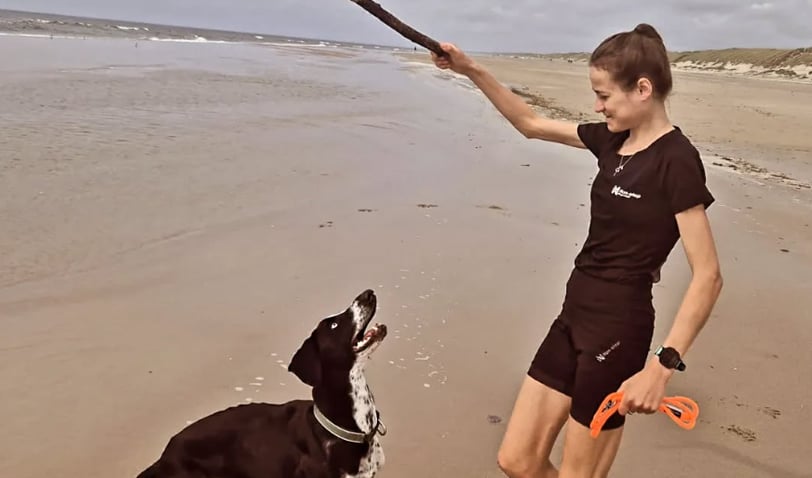

Ben Robinson delivered an impressive performance, finishing the first day with a time of 12:12.17, solidifying his position as the title favorite. Right behind him, the Frenchman Jerome Henrion clocked 12:23.20, promising a fierce competition ahead. One of the standout performances came from Carolin Joeken, who achieved the fifth best overall time, placing her at the front for Day 2, ahead of legends like Antony Le Moigne, among other extremely fast men.
